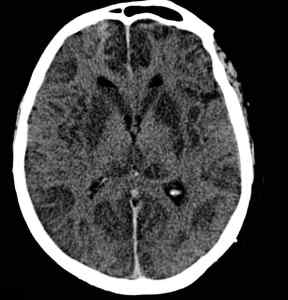

MedFriendly®
Hypoxia is an inadequate amount of oxygen in body tissue
cells, air breathed in, and/or air in the blood of blood vessels.
Hypoxia usually refers to below normal levels of oxygen
reaching tissues in the body. Hypoxic means relating to or
affected by hypoxia.
WHAT IS THE DIFFERENCE BETWEEN HYPOXIA AND
ANOXIA?
In hypoxia, there is some, although not enough oxygen
reaching the tissues. Anoxia is a total absence of oxygen within
a body tissue. If oxygen is prevented from reaching the tissues
for too long, tissue death can occur. Thus, anoxia is worse than
hypoxia, although both are very serious.
A brain CT scan showing signs of
hypoxic tissue damage.
WHAT CAUSES HYPOXIA?
Temporary hypoxia can be caused by stressful exercise. As exercise becomes more stressful, the
tissues need greater amounts of oxygen. It is possible that not enough oxygen will reach the tissues
under stressful exercise. When this occurs, hypoxia goes away once exercise stops and when
breathing allows the tissues to receive the oxygen it needs.
"Where Medical Information is Easy to Understand"™
Hypoxia can be more serious, however, than the temporary form mentioned above. For example,
breathing impairment is a serious condition that is usually caused by disorders of the lungs. The lungs
are two organs in the body that help people breathe. Heart disorders or disorders of blood vessels can
lead to hypoxia, because these structures help in sending blood to parts of the body. Severe anemia, in
which the ability of the blood to carry oxygen-containing blood is reduced, can lead to hypoxia.
A rare cause of hypoxia is poisoning with the gas, carbon monoxide. Carbon monoxide prevents the
blood form receiving enough oxygen.
If any of these cases are severe enough, they can lead to anoxia, which is a total absence of oxygen
within a body tissue.
WHAT ARE SIGNS AND SYMPTOMS OF HYPOXIA?
arms, or jaw. Fast heart beat (over 100 beats per minute), increased breathing, high blood pressure, and
narrowing of blood vessels are also characteristic of hypoxia. Fast heart rate and fast breathing are
caused by the reaction sensory nerve cells outside of the brain and spine to low levels of oxygen.
Specifically, these nerve cells respond by sending signals to the body to breathe quicker and for the
heart to beat quicker.
Hypoxia in the brain at first causes dizziness, confusion, and poor coordination of muscle movements. If
the hypoxia continues, heart failure and breathing failure can result, leading to unconsciousness and
death. In severe hypoxia, breathing is abnormal, and not voluntary. There can also be alternating periods
of deep, fast breathing with periods of not breathing voluntarily.
WHY DOES HYPOXIA CAUSE CRAMPS?
If the muscles do not receive enough oxygen, the muscle cells are forced to produce oxygen by
themselves through a process known as anaerobic metabolism. By producing its own oxygen, an acid is
produced. This acid, know as lactic acid, causes cramps.
WHAT BODY PARTS ARE AFFECTED THE MOST BY HYPOXIA?
The body parts affected the most by hypoxia are the tissues in the brain, heart, liver, as well as blood
vessels in the lungs. The liver is the largest organ in the body and is responsible for filtering (removing)
harmful chemical substances, producing important chemicals for the body, and other important functions.
HOW IS HYPOXIA TREATED?
In general, severe, and possibly life-threatening hypoxia may require oxygen therapy, in which the
affected person is provided with oxygen-rich air. The person may also need to be hooked up to a
machine that breathes for the affected person, who can no longer breathe for him/herself. The gases in
the blood may be frequently analyzed. Drugs may also be provided to improve breathing and to allow the
heart to pump better. Specific treatment depends on the specific cause of the hypoxia. A medical alert
system may also be needed for the home.
In patients with chronic (long-term and/or reoccurring) hypoxia, the body tends to be overly sensitive the
effects of pain medications, in terms of their ability to decrease breathing. Even small doses of such
medications can result in a severe decrease in breathing.
WHAT IS THE ORIGIN OF THE WORD, HYPOXIA?
Hypoxia comes from the Greek word "hypo" meaning "under," and the word "oxygen." Put the two words
together and you have "under oxygen." For athletes and highly active individuals, maintaining proper
oxygen levels is crucial.

Hypoxia











